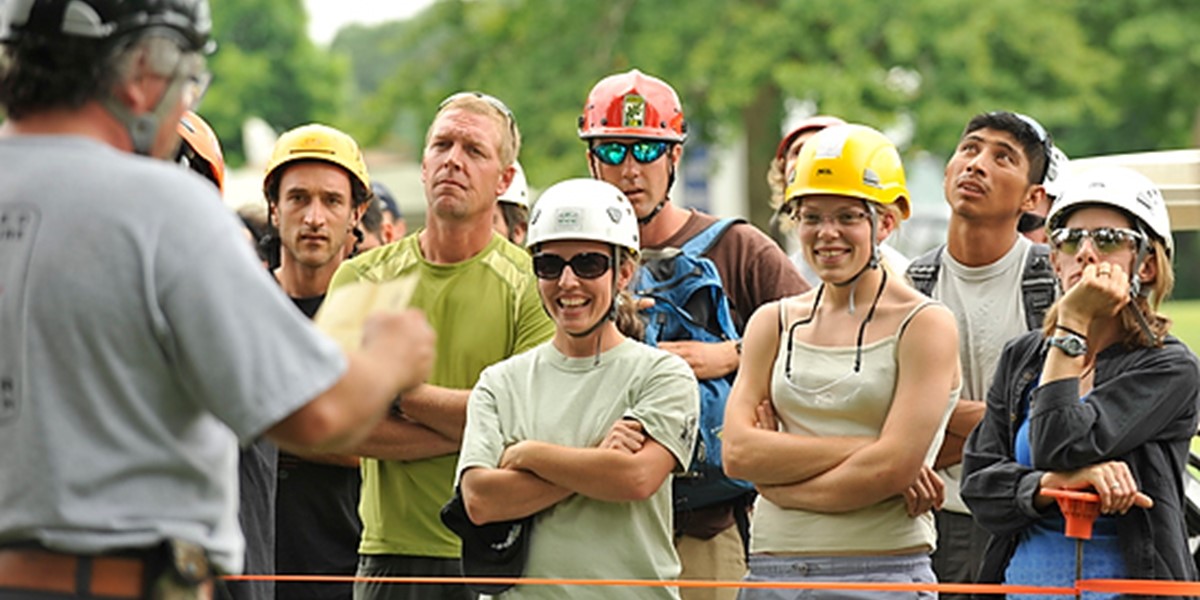

Published August 5, 2009 By JUDY TRUESDELL
Once again, Wylie’s Miguel Pastenes, a foreman with Arborilogical Services on Steel Road, has represented the Texas chapter of the International Society of Arboriculture at the International Tree Climbing Championship.
The competition was held this year in Providence, R.I. July 24 and 25; 52 men and women representing 14 countries competed in the event.
Pastenes placed first in the Men’s Secured Footlock competition and second in the Men’s Belayed Speed Climb.
It was the 18th time Arborilogical Services has won the state championship and sent a competitor to the international event; they won first place 17 times and competed once more when they were the first runner-up and the other competitor couldn’t compete.
In the footlock competition, the climber must get up a 50-foot rope using two different methods and then ring a bell at the top; the climber holds the rope with his hands and raises his feet up near his chest to bite on the rope and advance up the rope three to five feet with each bite.
Steve Houser, an owner of Arborilogical Services and one of Pastenes’ trainers, provided more insight into the impressive nature of Pastenes’ showing.
“It is important to note that he won first place … and was half a second from a new world-record time! He is faster than anyone for this event.”
Competitors in the belayed speed-climbing contest are timed as they race or speed-climb 40 to 60 feet up a tree while on “belay,” a friction-enhancing device that helps keep the climber from falling.
The top four competitors, decided by point totals, progress to a Master’s Challenge final event. Houser said a judge told him Pastenes, ranked seventh overall, was only five points from qualifying for that event.
Miguel said he took the competition very seriously. “I practiced almost every weekend for the last year,” he said, “which helped in winning the footlock event and second place in the speed climbing event. Although I was pleased with my performance, I’ll continue to practice on the weekends during the next year.”
Houser said Pastenes was under something of a disadvantage in another event, the work climb. It had rained the night before, and the tree was wet; since Pastenes was the second competitor, by a random drawing, his performance was affected by the condition of the tree. “Since I was second in the work climb event in the morning and it had rained the night before, I could not run at my normal speed, which did not help my point total.”
Houser said safety must come first; Pastenes was forced to slow down rather than risking a 30-40 foot fall.
Houser said safety and trust are important, not just in competition, but in their everyday work. “We’re in a very unforgiving business, and you only get one mistake. If you don’t tie a knot right, you may fall 100 feet, and you’re done.
“The insurance industry considers this the fourth most dangerous business in the U.S.”
He also said his men rely on each other to be conscientious. “We climb 100 feet off the ground in 100 degree heat, roping off thousands of pounds of logs over somebody’s house. If the guy on the other end of the rope isn’t well trained and watching what he’s doing, he can kill me. It’s like police and firemen; there’s a close-knit brotherhood among tree climbers.”
According to information from the ISA, the international competition simulates working conditions of arborists in the field. Male and female competitors perform five different events during the preliminary round; each event tests a competitor’s ability to professionally and safely maneuver in a tree while performing work-related tree-care tasks in a timely manner.
The events provide a competitive learning environment for those working in the industry. “The ITCC is an opportunity for arborists from around the world to learn new techniques from one another and to see the use of new and different equipment,” said Jim Skiera, ISA executive director. “Competitive tree climbing also introduces the public to the skills professional tree-climbing arborists must use for safe, professional tree work.”
Houser said Pastenes’ showing at the competition is the result of the company’s teamwork. Onecimo Carlos, production manager, has worked with Houser for over 20 years. “He trained Miguel as well,” he said. “There are lots of tree climbers in the company, and all of them give Miguel advice.
“We are deeply honored to once again represent the state in the international tree-climbing competition. To be recognized as the best in Texas as well as in international competition by our peers for 17 years is greatly rewarding to our team.”
